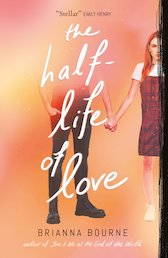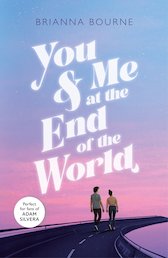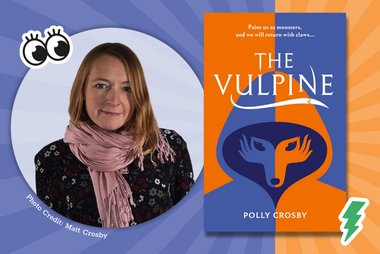Brianna Bourne, author of The Half-Life of Love, on character building, bucket lists, writing tips and more 💕
To celebrate the release of The Half-Life of Love, we chat with author Brianna Bourne. Find out about her character-building process, writing psychological dystopias, the concept of death days and more.

How did the characters of Flint and September come to you?
When I’m shaping new characters, I start from the core theme of the book and work backwards from there. For me, the characters have to be emotional beings before their surface traits (appearance, hobbies, quirks, favourites, etc.) fall into place.
The Half-Life of Love essentially asks the question: Is it better to know that you’re going to die, or is it better to be blissfully ignorant? I knew that I wanted this to be a love story between two people, so they both had to have close personal experiences with the Half-Life. What two people would be the most affected by this phenomenon? Eventually I came up with someone who knows they’re going to die young, and someone who’s been affected by a painful Half-Life loss already.
Flint knows he won’t make it past his eighteenth birthday, and I decided he would (understandably) be devastated by that fact. The heartbreak of it has seeped into every corner of him, and he’s become broody and sad; he wears all black and never smiles.
And then I decided September needed to be his opposite (I love a grumpy/sunshine romance) —but her sunniness is hiding a deeper, darker layer that she’s too afraid to confront. As their characters developed more in my head, they became exactly what the other needed.
Both of your novels take place in dystopian landscapes – why does this genre appeal to you?
They’re more ‘psychological dystopia,’ I guess! They’re not set in the future, or in a world where society has crumbled to a gritty unrecognizable thing – both of my books’ settings are more subtly surreal. In You & Me at the End of the World, Hannah and Leo wake up to their present-day city exactly as they expect it to be: only it’s empty of all other people. In The Half-Life of Love Flint and September live in a world that’s exactly like ours, but everyone knows when they’re going to die.
The beauty of psychological dystopia, and what fascinates me enough to write whole stories set in these kinds of alternate realities, is that it allows readers to explore huge “What if…?” questions. What would it be like if you woke up and everyone was gone? What would it be like if you knew you weren’t going to make it past your seventeenth birthday? How would you feel? What would you do?
And sometimes, asking big ‘What If’ questions helps us appreciate what we do have in our world. 🧡
Did you have any alternative endings you nearly used instead?
I’m so glad you asked, because I absolutely did. An earlier draft had a drastically different ending, and it just didn’t feel right. I could tell it was making the story… forgettable. On a hunch, I tried writing the last few chapters of the book the way it is now, and it felt right. From what I’m hearing so far from readers, it was exactly the right call.
In The Half Life of Love, everyone finds out when they have reached the half way point of their life. What would be on your bucket list if you knew when you were going to die?
I would head straight for the airport. I love traveling to places that seem (on the surface) so different to where I live. I am constantly fascinated to see that humans have so much in common no matter where they are, and I’d need a big dose of ‘humanity is beautiful’ before kicking the bucket. I love food too, so I would be eating my way through Thailand, India, Mexico—every country in the world if I could afford it!
What made you want to write about a world where everyone knew their ‘death day’?
The question ‘Is it better to know or not know when you’re going to die?’ has been knocking around in my head for so many years. I would daydream dozens of scenarios, but I could never make up my mind! I created Flint and September and their story so we could experience the question through their eyes and hearts, up close and personal.
I always love hearing from readers, so let me know what you’ve decided after you read!
Do you have any writing tips for people wanting to create their own stories?
Read as many books as you can – and then read about the mechanics of storytelling. You can eat hundreds of cakes and enjoy them, and even declare that some are tastier than others, but to make one of your own you have to have a recipe, right? You also have to know how a recipe works, what the standard terms are, how to weigh flour, etc.
The good news is that there are so many writing resources online now. And once you know the mechanics, you start to see how your favourite authors craft their recipes to tell the story they want to tell.
What is your favourite thing about being an author?
Holding a whole story in my head, with all its gorgeously flawed characters, is amazing fun. Each book is a complex puzzle to work out, and as a child I loved all kinds of puzzles. My mind gets restless if it doesn’t have something to chew on!
Once a story is out in the world, almost nothing can beat walking into a Waterstones and seeing my books on a table. But the very best part is when I get messages from readers saying how deeply my stories affected them. 🧡

Buy Brianna’s books
-
 The Half-Life of Love
The Half-Life of Love
- gbp prices
- Offer price: £3.99
- Rewards/RRP: £8.99
-
 You & Me at the End of the World
You & Me at the End of the World
Similar Posts
-
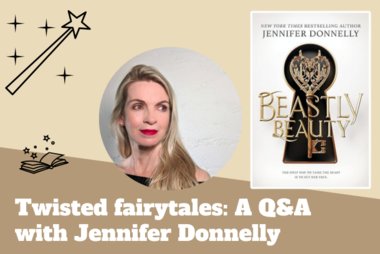
Twisted fairytales: A Q&A with Jennifer Donnelly
We chat to New York Times bestselling, Carnegie-award-winning author Jennifer Donnelly about writing retellings, the power of fairytales and her brand new YA novel Beastly Beauty.
-
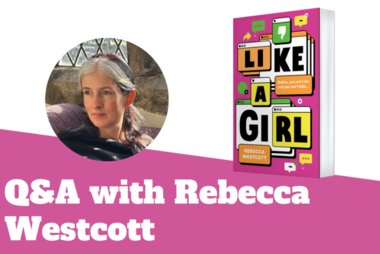
A Q&A with Rebecca Westcott, author of Like a Girl
We spoke to author Rebecca Westcott who answered questions about her latest teen novel, Like a Girl.


